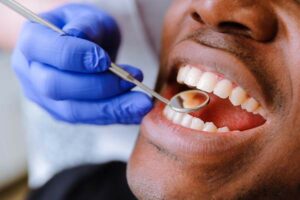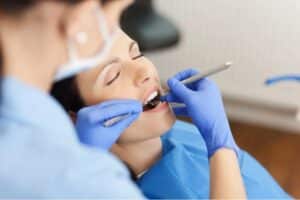Gum disease is one of the most destructive dental conditions. It starts mildly so that you may not notice it, but if left untreated it becomes one of the most common causes for complete or partial tooth loss. In fact, 90% of edentulous patients suffered from gum disease at some point. Moreover, it is not a condition that affects only your gums; it will affect your teeth, your bone, and even your general health. There are studies that show a direct relationship between gum disease and diabetes, heart conditions, and cancer. Luckily, it is a condition that can be efficaciously treated and prevented.
Gum disease is essentially an infection of the soft tissue in your mouth caused by the accumulation of bacterial plaque. It starts in a mild variation known as gingivitis, and it affects only your gums. As the condition advances bacteria accumulate in pockets that separate the gums from your teeth. Over time this continues on to the bone and affects the position and stability of teeth. When it reaches the point in which teeth are no longer properly supported by bone structure, then it is time to extract. As the condition gets advances, the damage is irreversible. Therefore, it is very important to notice its symptoms during the early stages. Here are five of the most noticeable signs you may be suffering periodontitis.
Swollen or bleeding gums
Have you noticed that your gums bleed easily when you brush your teeth or floss? Bleeding is a sign that your gums are swollen and this is one of the first symptoms of gum disease. They may also feel tender or painful.
Bad breath
Bacteria are decomposers. They live on food on your tongue or in between teeth. They particularly flourish in an environment rich in starch, and when they do, they release toxins that irritate the gums and have a foul smell. This is why it is so important to brush and floss after each meal, so as to remove particles of food that will become a haven for bacteria.
Receding gums
This is one of the first signs that the gingivitis is turning into periodontitis. Gums can recede for many reasons, but when you notice they do on several teeth at the same time, it may be a sign something is going on. When the plaque starts to reach the bone level, the pockets become so deep that they expose the tooth roots. This makes it seem teeth are longer but it really means gums are shrinking.
Sensitivity
As gums recede, they expose parts of the tooth that should never have contact with the environment. The roots are not covered with the white, hard layer called enamel; they are made up of a layer called dentin that is much more porous and yellowish. As gums shrink, they expose parts of this layer that is not as protective as enamel. This is the reason you may react more to temperature if you have gum disease.
Wiggly or shifting teeth
This is a symptom of advanced periodontal disease. If you notice that your teeth have changed position over little time or if you feel they have become loose, then it is definitely time to visit your dentist. Tooth mobility is caused by severe bone loss and little bone support. There is little to be done at this stage.
Gum disease is preventable with regular professional cleanings and a strict cleaning schedule. There are also many rinses that can help maintain cleanliness and prevent the accumulation of plaque. If you have reached the advanced stages, there may be a possibility that the disease affects only a localized area and you could save several other teeth. Usually a couple of implants or bridges can help replace those unlucky ones. If your condition is generalized, you may slowly loose all your teeth. This can be resolved with fixed or removable implant-supported dentures, also known as all-on-4.
At the Costa Rica Dental Team, we receive such cases that require extensive work, but we are up for the challenge. Contact us for a free quote on your dental plan.




